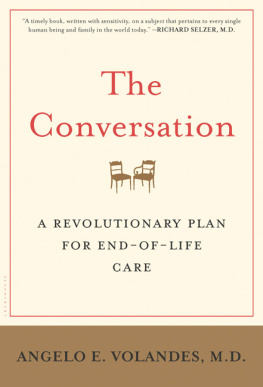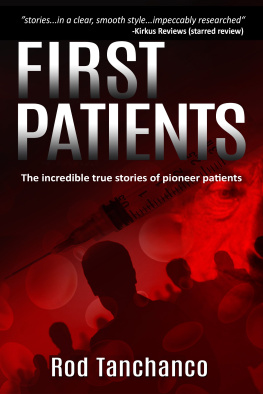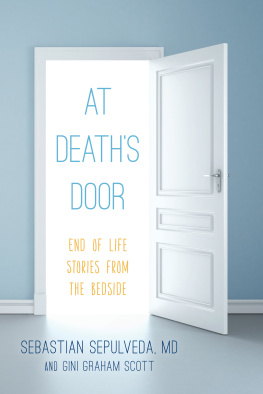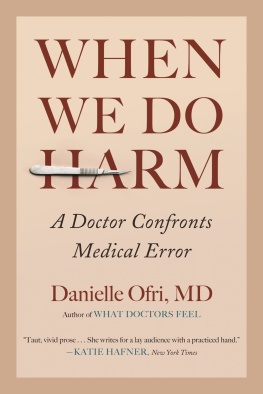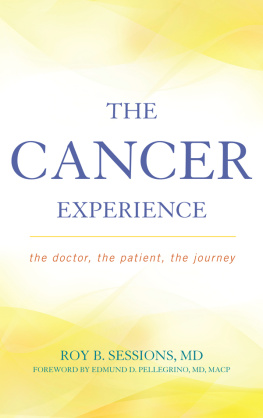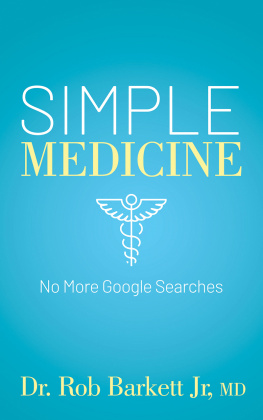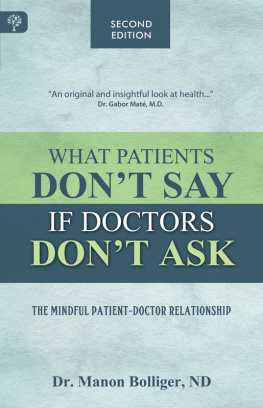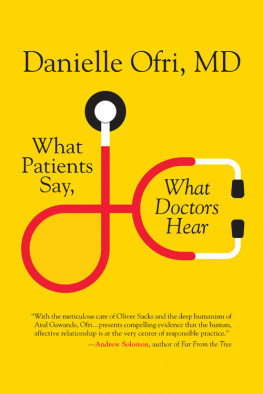This book is not only an exploration of lifes final chapter, but also a chronicle of my coming-of-age as a doctor. My guides along this journey remain the same teachers who have taught every physician: patients. These are their stories. I am profoundly indebted to each of them.
As a first-time author, I have had the good fortune to work with an amazing literary agent, editor, and publishing house. Will Lippincott, of Lippincott Massie McQuilkin, saw the early promise of this project and then shepherded it from start to finish. My editor, Nancy Miller, of Bloomsbury Publishing, provided invaluable editorial guidance, support, and encouragement. I am grateful to both of them for believing in this project.
Writing a book is a process, and one that rivals the grueling days and nights of training to be a physician. There were many readers of this manuscript who helped guide me along the way. I am especially thankful to Muriel Gillick, who helped me find my voice. I am also obliged to my inner circle of readers who have accompanied me on this journey: Elmer Abbo, Michael Paasche-Orlow, Hacho Bohossian, William Kennedy, and Areej El-Jawahri. I am especially thankful to Matt Handley, Elizabeth Marshall, Jonathan Rauch, Daniel Matlock, Robert J. Levine, Tia Powell, Lenny Lpez, Sara Paasche-Orlow, and Jenn Shin, who read earlier versions of this book.
I owe a great debt to Professor Kirsty Milne for challenging me throughout the writing of this book on what it means to be on the other side of the stethoscope; I only wish she had lived to see it in print.
I am fortunate to lead a phenomenal group of innovative researchers. The Video Images of Disease for Ethical Outcomes (VIDEO) Consortium consists of many individuals from academic medical centers across the country. Their commitment and dedication to educating the public and increasing discussions between doctors and patients is unrivaled. I especially want to thank Michael Barry, Susan Mitchell, Elizabeth Walker-Corkery, Zara Cooper, Jennifer Temel, Vicki Anne Jackson, Josh Metlay, Katrina Armstrong, Tom Smith, Andrew Epstein, Jane Schell, Ruth Carroll, Eileen Mann, Yuchiao Chang, Nwamaka Eneanya, Ann OHare, Alvin Woody Moss, Michael Germain, Manjula Tamura, Vincent Mor, Joan Teno, Lewis Cohen, Ariela Noy, Tomer Levin, Pat Agre, Fatima Rodriguez, Sam Rodriguez, Kenneth Minaker, Monera Wong, Ardeshir Hashmi, and Rebecca Aslakson for their unwavering support. A special thank-you goes to Diane Meier, who taught me the power of effecting change with patient stories.
I am also thankful to Hilton Raethel, Rae Seitz, Robert Eubanks, Lori Protzman, Michelle Cantillo, Daniel Fischberg, Anna Loengard, and the wonderful people of Hawaii for helping me translate this work into clinical practice in an effort to transform health care. I believe that the experience of Hawaii, the little mouse that roars, will help improve the quality of care delivered to all Americans.
I am grateful to the Melik-Baschkopf Foundation and its directors, Edward H. Dietrich, Andrea Reiff, and Milton Kahn, for their financial support that continues to help change the culture of medicine around the country.
Three individuals who have raised awareness of The Conversation in the wider community include three giants in the field: Ellen Goodman, Bernard Bud Hammes, and Susan Tolle. Ellen has made honoring peoples choices a social movement with the Conversation Project; Bud had a vision that has literally transformed the lives of thousands of Americans already with Respecting Choices; and Susan Tolle had the courage to preserve patients voices when no one else did with the POLST paradigm. I am grateful to each one of them, and my work is a testament to their enduring influence on all of us.
With respect to the video, all of the medical staff, patients, and/or their families have permitted me to use their images and voices for the purposes of educating the public. Unlike names and facts that can be easily altered to protect confidentiality, visual images are far less malleable without distracting from their educational purpose. As such, for the most part I have not obscured the faces of the people in the videos. I am eternally grateful to the staff, patients, and families for their charitable gift to us all, and I strongly encourage my readers to consider and respect their gift.
My family of readers has helped me balance work, life, and writing during the decade it has taken me to craft this book. I am thankful to Peter Volandes, Ava Volandes, Sophia Volandes, Stellene Volandes, Cayla Volandes, Kenneth Volandes, Marina Volandes, Aleko Tavantzis, Angelos Konstas, Shane Genakos, Bennett Ruiz, and Jake Young.
A heartfelt thank-you to my loving mother-in-law, Winifred Maggie Davis, who, through her own personal struggles with end-of-life decision-making for her husband, my late wonderful father-in-law, informs many of these pages.
My parents deserve special thanks. Their experiences of coming to this country, not speaking a word of English, and toiling for years washing dishes and collecting nickel and dime tips in a New York City diner to help send their children to the best schools in the world is humbling. Thank you for giving me the Ancient Greek literature, poetry, drama, and philosophy books during childhood, when we could afford only the tattered, secondhand copies from the Salvation Army store. I love you both dearly, and the greatest gift I can give back to you is to introduce those same books and ideas to your grandchildren.
Most of all, I want to thank my wife, Aretha Delight Davis, and our two children, Angeliki Agape and Evangelia Faith. From the second week of freshman year in college when we met, Aretha has remained my souls perfect reflection. She has been my lifelong interlocutor and partner who, despite my imperfections, continues to tolerate my crazy ideas, like using our living room as a film studio. As an accomplished physician and lawyer in her own right, Aretha shaped my understanding of the practice of medicine at a systems level. Every word in this book has been influenced and molded by our endless conversations, a veritable Socratic dialogue in our living room. Thank you for remaining by my side and guiding me on this amazing writing journey and on our own journey together called life. Most of all, thank you for giving us the two greatest gifts in the world, our daughters. This book would not be possible without your love.
NO ONE EVER ASKED ME WHAT I WANTED
At the ripe old age of eighty-nine, Mr. Tanaka had lived through two wars, the indignity of Japanese internment camps, a happy marriage to his wife of sixty years, the birth of five children, the death of his wife, and the scattering of dozens of grandchildren and great-grandchildren throughout the country. Now he was being shuffled between his nursing home and a large hospital in Honolulu.
Seeking a more relaxed life, Mr. Tanaka and his wife had decided to retire in Hawaii, so they sold their West Coast ranch house and bought a condo in Honolulu. Their life in tropical paradise was highlighted with Christmas visits with their children and the myriad visits by grandchildren and great-grandchildren during spring break. All of that changed after the death of his wife. Soon, Mr. Tanaka was no longer able to care for himself at home. He sold the condo and moved into an assisted living complex; in time, he graduated to the nursing home wing of the facility.
The slow winding down of his body brought with it urinary infections and other difficulties. With each complication, he was transferred to the hospital and then back to the nursing home. This happened so frequently that he often wondered why the hospital bothered sending him back. This time, once home, he would not return.
Mr. Tanaka, we want to honor and respect your choices regarding medical care, a doctor from the nursing home told him. We are starting a new statewide initiative by asking all of our residents for their thoughts. Have you ever had a discussion with your family about your wishes for medical care? About how you want to live your life?
Next page
